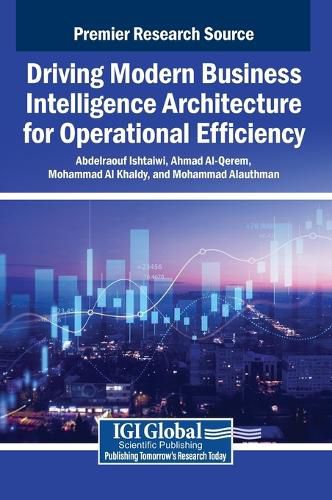Readings Newsletter
Become a Readings Member to make your shopping experience even easier.
Sign in or sign up for free!
You’re not far away from qualifying for FREE standard shipping within Australia
You’ve qualified for FREE standard shipping within Australia
The cart is loading…






This title is printed to order. This book may have been self-published. If so, we cannot guarantee the quality of the content. In the main most books will have gone through the editing process however some may not. We therefore suggest that you be aware of this before ordering this book. If in doubt check either the author or publisher’s details as we are unable to accept any returns unless they are faulty. Please contact us if you have any questions.
Driving modern business intelligence (BI) architecture is essential for organizations to enhance operational efficiency and make data-driven decisions. As businesses accumulate large amounts of data from diverse sources, traditional BI tools struggle to deliver real-time insights and agility. Modern BI architecture leverages cloud-based platforms, data lakes, AI-driven analytics, and self-service capabilities to unify data access and accelerate decision-making. This empowers stakeholders across departments with actionable intelligence and streamline operations by identifying inefficiencies, predicting trends, and automating analysis. Further research into an adaptive BI framework may assist with future business strategies. Driving Modern Business Intelligence Architecture for Operational Efficiency explores the evolving landscape of data management within BI systems, addressing organizations' critical challenges in managing, processing, and utilizing vast amounts of data for strategic decision-making. It offers insights into cutting-edge tools, methodologies, and best practices for effective data management in BI environments. This book covers topics such as data governance, predictive security, and machine learning, and is a useful resource for computer engineers, business owners, economists, academicians, researchers, and data scientists.
$9.00 standard shipping within Australia
FREE standard shipping within Australia for orders over $100.00
Express & International shipping calculated at checkout
Stock availability can be subject to change without notice. We recommend calling the shop or contacting our online team to check availability of low stock items. Please see our Shopping Online page for more details.
This title is printed to order. This book may have been self-published. If so, we cannot guarantee the quality of the content. In the main most books will have gone through the editing process however some may not. We therefore suggest that you be aware of this before ordering this book. If in doubt check either the author or publisher’s details as we are unable to accept any returns unless they are faulty. Please contact us if you have any questions.
Driving modern business intelligence (BI) architecture is essential for organizations to enhance operational efficiency and make data-driven decisions. As businesses accumulate large amounts of data from diverse sources, traditional BI tools struggle to deliver real-time insights and agility. Modern BI architecture leverages cloud-based platforms, data lakes, AI-driven analytics, and self-service capabilities to unify data access and accelerate decision-making. This empowers stakeholders across departments with actionable intelligence and streamline operations by identifying inefficiencies, predicting trends, and automating analysis. Further research into an adaptive BI framework may assist with future business strategies. Driving Modern Business Intelligence Architecture for Operational Efficiency explores the evolving landscape of data management within BI systems, addressing organizations' critical challenges in managing, processing, and utilizing vast amounts of data for strategic decision-making. It offers insights into cutting-edge tools, methodologies, and best practices for effective data management in BI environments. This book covers topics such as data governance, predictive security, and machine learning, and is a useful resource for computer engineers, business owners, economists, academicians, researchers, and data scientists.